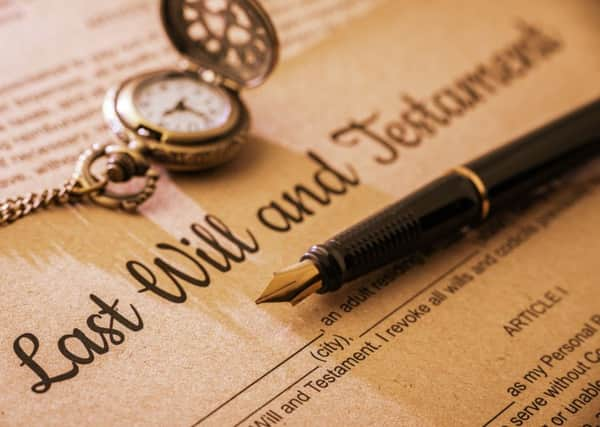Andrew Patersosn: Don't be another inheritance tax statistic


As with most forms of taxation, inheritance tax is not free from controversy. Some feel that inheritance tax is an essential aspect of the redistribution of wealth, whereas others consider it unfair to tax assets which have been accumulated (and potentially already subject to income tax) during one’s lifetime. Indeed, many other countries do not currently impose an inheritance tax.
Irrespective of the theory, there is a widespread lack of understanding regarding inheritance tax. February 2017 research conducted by Consumer Intelligence indicated that despite concerns regarding inheritance tax, fewer than 10 per cent are seeking financial advice and less than 5 per cent were aware of the average inheritance tax bill. inheritance tax is traditionally seen as only affecting the very wealthy (by way of example, it was a key plot point in Downton Abbey), but more and more individuals are falling over the inheritance tax thresholds, particularly in locations such as Edinburgh with a buoyant housing market.
Advertisement
Hide AdAdvertisement
Hide AdInheritance Tax is payable on estates valued over a threshold of £325,000 for single people and £650,000 for married couples and those in civil partnerships. It is generally charged at a rate of 40 per cent on any portion of an estate exceeding these thresholds.
Changes introduced by the UK government in April this year mean that people can pass on an additional £100,000 to a direct descendent to offset the value of the family home, taking the allowance for single people to £425,000 and £850,000 for couples. This additional allowance will increase in stages to £175,000 by 2020, giving married couples and those in civil partnerships a total inheritance tax threshold of £1 million.
There are a number of inheritance tax exemptions and reliefs. These mean that there are options available if you wish to investigate reducing your potential inheritance tax bill and therefore maximising how much you leave to your successors. The most straightforward option, if you can afford to do it, remains to give assets away. If you survive seven years from the date of a gift to an individual, that gift is completely exempt from inheritance tax. You could therefore give away assets with an unlimited value at any stage and, provided that you survive for seven years, the assets disposed of would be totally outwith your estate for inheritance tax purposes.
The inevitable questions to consider are how much to give away and to whom to give it. When considering the amount to gift it is critical to retain sufficient assets and income to maintain your standard of living for the rest of your life. Potential future care costs are a key issue in that regard.
An appropriate recipient(s) for your gift can be even more sensitive. Older individuals are now often choosing to skip their children and make gifts directly to grandchildren to provide much needed financial assistance at an earlier stage in life. Consideration may need to be given to how to achieve equality and fairness among different branches of a family when what is fair can depend upon the eye of the beholder. Some donors even seek to take account of how a recipient might use a gift and retain a degree of control in that regard. The current rates of relationship breakdown in the UK are likely to be a key factor in that regard.
Everyone will have different views on these issues but, whatever your perspective, if you think that your estate may be affected by inheritance tax then take appropriate professional advice, consider the options available in your circumstances and make a fully informed decision about what action, if any, you wish to take. Do not become just another uninformed inheritance tax statistic!
Andrew Paterson is a partner in the Asset Protection Group, Murray Beith Murray